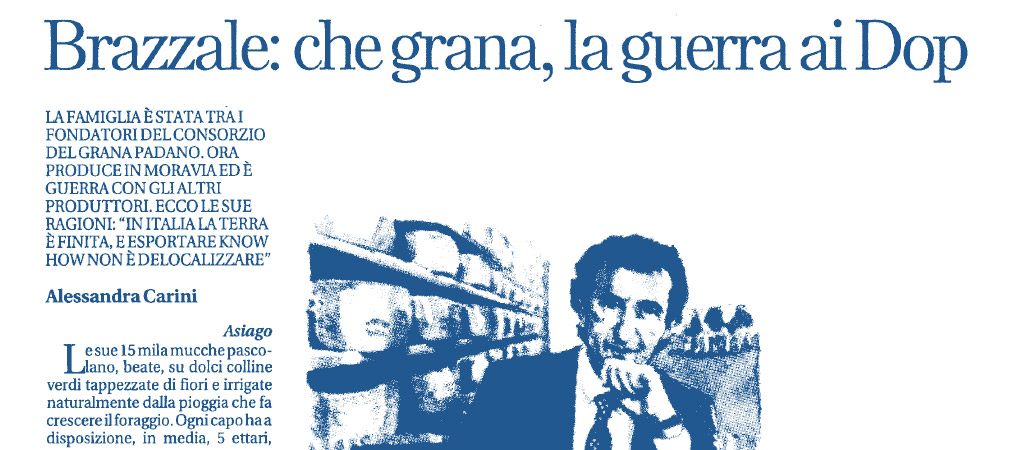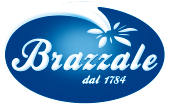
THE FAMILY WAS ONE OF THE FOUNDERS OF THE GRANA PADANA CONSORTIUM. IT NOW PRODUCES IN MORAVIA AND THE OTHER PRODUCERS HAVE DECLARED WAR. HERE ARE THE REASONS: “THERE IS NO MORE LAND AVAILABLE IN ITALY, AND EXPORTING KNOW-HOW IS NOT THE SAME AS DELOCALISING”
Alessandra Carini
Asiago
Its 15 thousand cows happily graze on the rolling green hills carpeted with flowers and naturally irrigated by rain that makes the crop grow. Each cow has, on average, an area of 5 hectares in which to graze, they are bred with free range or individual stalls in the 70 farms that make up the dairy farm. The overall production of milk per day amounts to 380 thousand litres of milk per day, which constitute the raw material for a cheese very similar to Parmesan. Too bad that this paradise is not in Italy but in the Moravian region of the Czech Republic from which the cheese takes its name to also be sold in Italy. It is however made by an Italian company, the oldest in the dairy milk sector, Brazzale. At the end of the 1700s Brazzale sold butter and cheese among the pastures of the Asiago Altopiano and the Vicenza plains. One of their ancestors, Giovanni, was the first in the forties, to produce Grana Padano in the Vicenza hills. Today it is a highly respected Group that, with its cheese and butter sold in half the world, has a turnover of €180 million a year. Six brands (Verena, Alpilatte, Burro delle Alpi, Gran Moravia, Zogi and Silvopastoril), production facilities in Italy, Czech Republic and Brazil, the Brazzale Group has thrown a stone in an already agitated pond of Italian agriculture made of niches, PDOs and zero-kilometre markets: to produce using Italian know-how, but outside of Italy, a quality cheese, at lower prices, using an ultra-certified supply chain. This has resulted in an uproar, even if the quantity of Gran Moravia is but a fraction, 60 million, of their production: what will happen if agriculture starts to relocate too? As Roberto Brazzale, CEO of the parent company, say, “What do you mean when you say relocation, if you want to develop a dairy farm and you are obliged to move outside of Italy, because you cannot grow here?”
You don’t mean to say that in Italy agriculture cannot develop any further?
“What I mean is there is no more land, we are at the maximum limit for water, with dangerous consequences for health. We grow corn where corn is not suitable: land is expensive, yields must be extremely high if not, there is no compensation for costs. Since we grow produce under the scorching sun, we need to channel water from the Alps.
And the stress that fodder is subject to concerning water generates huge health problems such as aflatoxins which are carcinogenic. So I have gone elsewhere where it is possible to produce in different conditions.”
But there is always quality agriculture, tied to the territory …
“Of course there is. But must the quality of Italian industry and agriculture remain tied to a territory that is so small? Why should it? Do we really only want to produce niche products, at huge costs, in a world where the demand for dairy products is growing at 2% and where there is a demand that certainly cannot afford to pay those prices.”
What is left for agriculture if everyone follows your example?
“First of all, we have not taken anything away from Italy, where agriculture, as far as Italy is concerned, only keeps its head above water thanks to foreign workers, often living in conditions near slavery. The future is not a cow milked by an Indian worker in Italy, however good this may be. It is using our strength, the quality of our people to make butter and cheese where the conditions are ideal. Moreover the ageing, packaging and distribution all remain here in Italy.”
Yes, but your Gran Moravia is very similar to Parmesan cheese. Is there a risk of destroying typicality?
“These are all excuses of a corporate system that defends itself because it wants to continue to live off this advantageous position and will invent anything possible to avoid discussing these issues.”
Will it also defend its originality versus counterfeiting …?
“But it is not true. They have accused me of all sorts of things: that I could not use round forms as it would cause confusion with Parmesan even if the words Gran Moravia are written all over it in large letters. They also disputed this saying that people do not know where Moravia is. So I wrote on the label where the milk was produced. This was not enough either. Eventually I printed a multimedia label: just swipe with an iPhone and it connects to show photographs of the location and all the information on the supply chain that produces it.”
Who has declared war on you?
“Coldiretti, or rather the Coldiretti culture. Then the Grana Padano and Parmigiano consortia. We had to resign from the former. Even though we are one of the founding enterprises.”
Maybe because you copy their products.
“No, it’s because I produce good products at a lower cost and I violate a sacred principle: that is that good products can only be made in Italy. I think that this type of reasoning is a suicidal policy, because a wealth of knowledge and entrepreneurship has to stop, due to lack of resources, faced with a sort of protectionist and niche market policy.”
Do you think that others will follow in your footsteps?
“I hope so because we have a mass of under exploited professionalism in Italy, because there is no space and no land. Instead of stale ideologies I am convinced that we should challenge each other on concrete aspects: value for money, transparency for consumers, the traceability of the supply chain, its genuineness.”
[button color=”#ffffff” background=”#2582CF” size=”medium” src=”https://www.brazzale.com/wp-content/uploads/2013/07/20121029-Affari-e-Finanza-Guerra_ai_Dop.pdf”]DOWNLOAD PDF[/button]




